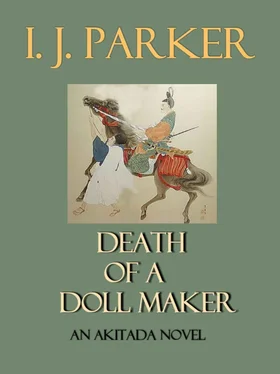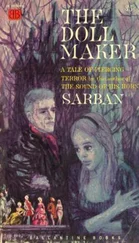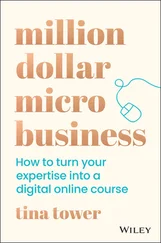I. Parker - Death of a Doll Maker
Здесь есть возможность читать онлайн «I. Parker - Death of a Doll Maker» весь текст электронной книги совершенно бесплатно (целиком полную версию без сокращений). В некоторых случаях можно слушать аудио, скачать через торрент в формате fb2 и присутствует краткое содержание. Жанр: Исторический детектив, на английском языке. Описание произведения, (предисловие) а так же отзывы посетителей доступны на портале библиотеки ЛибКат.
- Название:Death of a Doll Maker
- Автор:
- Жанр:
- Год:неизвестен
- ISBN:нет данных
- Рейтинг книги:4 / 5. Голосов: 1
-
Избранное:Добавить в избранное
- Отзывы:
-
Ваша оценка:
- 80
- 1
- 2
- 3
- 4
- 5
Death of a Doll Maker: краткое содержание, описание и аннотация
Предлагаем к чтению аннотацию, описание, краткое содержание или предисловие (зависит от того, что написал сам автор книги «Death of a Doll Maker»). Если вы не нашли необходимую информацию о книге — напишите в комментариях, мы постараемся отыскать её.
Death of a Doll Maker — читать онлайн бесплатно полную книгу (весь текст) целиком
Ниже представлен текст книги, разбитый по страницам. Система сохранения места последней прочитанной страницы, позволяет с удобством читать онлайн бесплатно книгу «Death of a Doll Maker», без необходимости каждый раз заново искать на чём Вы остановились. Поставьте закладку, и сможете в любой момент перейти на страницу, на которой закончили чтение.
Интервал:
Закладка:
“Maybe we should go back and talk to Mitsui’s neighbors again. Someone must have seen something that day.”
“The crime probably happened after dark. Most people were in bed and asleep.”
“Maybe not all. What about the woman Mrs. Kubota called a slut?”
Maeda started laughing. “Yoko? I thought you’d forgotten about her. Very well. We’ll talk to her tomorrow.”
They were passing an elaborate two-storied gatehouse, and Tora stopped. “Look at the size of the gate. What’s behind it?”
“The Hachiman shrine. Sacred to Emperor Ojin, Empress Jingu, and Princess Tamayori. You want to go in?”
“Well, I could ask the god to help us.”
Maeda stopped and grinned. “Why not? Nothing else comes to mind.”
9
Akitada spent every free moment, mostly after hours in his private study, going through the document boxes pertaining to shipping and trade in Hakata harbor. He paid special attention to trade with China and Koryo.
The government controlled and restricted all contact with foreigners by law. The fear of invasions had caused the court to deny foreign ships the right to land their people and goods on Japanese soil. Visitors were supposed to stay at the Korokan, the government’s lodge for foreigners. But noble families who owned coastal land allowed the foreign merchants to dock there and engage in trade. The court permitted this, because these families acted as intermediaries who funneled costly goods directly to the courtiers in the capital. Thus, an abundance of luxury goods entered the country from China in spite of the laws.
The Korokan was part of Chikuzen province, and therefore under Akitada’s authority. The noble families dealing with Chinese merchants, and perhaps with the Chinese government, were not. They traded under the protection of powerful men at court.
That left the Hakata merchants, both Japanese and Chinese. The presence of the Chinese settlement encouraged Japanese merchants from other parts of Japan to deal directly with the Chinese. And this trade was very rich indeed. As he read through his predecessor’s documents, Akitada found Chinese goods unloaded in Hakata harbor included perfumes, make-up, their ingredients, such as aloe, musk, clove, sandalwood, oils, and salves. Medicinal imports involved herbs and animal parts as well as betel nuts. Exotic objects, such as tiger and leopard skins and glass utensils, apparently were also in demand. In addition, of course, large amounts of silks and brocades made in China were brought into the country.
Akitada wondered how all these goods were being paid for, but the documents did not concern themselves with this. They noted only the harbor fees in aggregate as collected each month. Given the number of ships listed, these seemed very modest to him, and he searched for individual assessments. Certain ships seemed to have paid considerably less than others. In each case, a notation read “special cargo.” Akitada glanced up at the lighter rectangles on his walls and decided the special cargo might well have been art objects collected by Governor Tachibana.
At this point, he yawned and put the documents back into their boxes. He pulled out the letter he had been writing to Tamako, reread his last words, then added the line, “I’m as lonely as the pine on the sea shore, looking homeward, longing for the embrace of the wisteria vine.”
The next morning, another day of clear skies and birdsong, he was sipping his tea after the usual bowl of rice gruel, when Tora came in.
Akitada offered tea, but Tora shook his head. He poured himself some wine instead. Akitada said, “I don’t know how you can drink wine early in the morning. It just makes my head fuzzy.”
Tora drank deeply, smacked his lips, and poured another. “It makes my blood move faster,” he said with a grin. “That guard captain is a bastard. Teaching him his manners has worn me out.” He sat down. “I thought you might want to hear how the murder investigation is going.”
“Please.”
With considerable satisfaction, Tora described the sights and sounds of Hakata and outlined the case and the statements of the son and daughter. He was voluble about the shrine priest’s wife.
“Hmm,” said Akitada. “In my experience such behavior by children, though reprehensible, is often the result of something the parent has done. What about the son?”
“Oh, he’s a loser. He gambles and was fired for drunkenness. He claims he hasn’t been home for a long time, but he sees his father regularly when the old man delivers goods in Hakozaki. Apparently, they don’t get along. He made no effort to defend him and implied the father might have left early.”
“Hmm. What’s this about Hakozaki? What was the father delivering?”
“His dolls. There’s a shipping harbor there.”
“Yes, it’s privately owned. Can you find out what sorts of things are being traded there?”
“Maybe, though Maeda may not want to go back there. Hiroshi made him angry. He’s got a nasty mouth.”
“This investigation and your acquaintance with Sergeant Maeda are useful. You may as well continue.”
Tora looked quite happy about this. He quickly quaffed another cup of wine and departed with an airy wave of his hand, wishing his master “a fine day.”
Akitada pushed his tea cup aside and reached for the document box he had worked on the night before. Carrying this to the tribunal office, he felt sorry for himself. Tora was off to Hakata on the trail of a killer, and Saburo had plans to explore the city after dark tonight. He was the only one tied to dusty documents and government files, exactly the sort of thing he had hoped to escape in the capital.
Mori rose and bowed when he entered. Two strangers also rose from behind desks, bowing deeply.
“The scribes sent from Dazaifu,” Mori explained and introduced them. Akitada saw two nondescript middle-aged men he hoped were up to the work. They needed more staff, but there was hardly any money or rice to pay them. He nodded to the newcomers.
Mori seemed to have taken pains with his costume today. His robe looked new, and a formal small, stiff hat had replaced the soft one he had worn before. Akitada guessed Mori had dressed for his new position and to impress the scribes. He suppressed a smile as he sat down with his document box.
“Perhaps you can answer a question, Mori,” he said. “I see we unload all sorts of goods in Hakata harbor. What happens to these?”
“Oh, they are transferred to other ships, or taken overland by porters or ox carriage, or they are warehoused.”
“Hmm. In other words, they already have buyers? How are the Chinese merchants compensated?”
“Why, payment is in other goods, or rice, or gold, sir.”
“The documents only list taxes collected and names of ships. Who are the buyers?”
“Oh, it could be anybody, sir.”
“You mean you don’t know?”
“Well, sometimes we know. There was a Nara temple, for example, that bought a whole cargo of religious objects and books. And, of course, the local merchants buy some of the things.”
“Does the court in the capital purchase directly from the Chinese merchants?”
Mori looked blank. “I don’t think so, sir. The Chinese goods go mostly to local merchants or landowners. They pass them on to Japanese merchants.”
“I see.”
Actually, he did not see. It seemed to him there must be huge profits collected by local people. The trouble was one could deal with paperwork just so long, and then the facts and figures, those black characters on a white ground, started doing a mad dance, and one was completely lost. He thought again with envy of Tora, who was even now riding happily toward Hakozaki where real people were engaged in the activities he was trying to comprehend on paper.
Читать дальшеИнтервал:
Закладка:
Похожие книги на «Death of a Doll Maker»
Представляем Вашему вниманию похожие книги на «Death of a Doll Maker» списком для выбора. Мы отобрали схожую по названию и смыслу литературу в надежде предоставить читателям больше вариантов отыскать новые, интересные, ещё непрочитанные произведения.
Обсуждение, отзывы о книге «Death of a Doll Maker» и просто собственные мнения читателей. Оставьте ваши комментарии, напишите, что Вы думаете о произведении, его смысле или главных героях. Укажите что конкретно понравилось, а что нет, и почему Вы так считаете.












